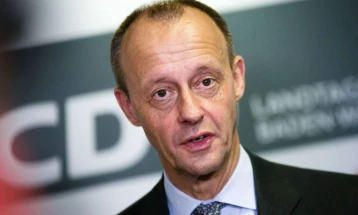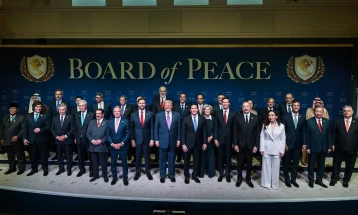Friedrich Merz set as German centre-right's candidate for chancellor
- German opposition leader Friedrich Merz is in position to be the conservative candidate for chancellor in next year's nationwide elections after picking up a key endorsement from a potential rival on Tuesday.

Berlin, 17 September 2024 (dpa/MIA) - German opposition leader Friedrich Merz is in position to be the conservative candidate for chancellor in next year's nationwide elections after picking up a key endorsement from a potential rival on Tuesday.
Bavaria's conservative state premier, Markus Söder, announced at a joint press conference in Berlin that he's backing Merz, the leader of the centre-right Christian Democrat (CDU), and will not seek the nomination himself.
Söder, the chairman of the CDU's Bavarian sister party, the Christian Social Union (CSU), has previously angled for the highest national office and has been seen as the leading potential rival to Merz for the conservative bloc's top candidacy.
Party sources told dpa that it is now all but certain that Merz will receive the nod as the lead candidate for the CDU/CSU bloc in nationwide parliamentary elections scheduled for September 28, 2025.
Merz said on Tuesday that he wants to bring conservatives back into power in Germany "with policies that put Germany back in the lead, with policies that make this country function again and policies that can perhaps also make us proud of our country again, of Germany."
Söder said that Merz has his "full backing" and "a very high level of personal respect." He added that the two men are unified in the goal of ousting Chancellor Olaf Scholz's unpopular centre-left coalition and "getting Germany back on track."
On Monday evening, Merz also earned the endorsement of another potential rival for the chancellor candidacy, Hendrik Wüst, the CDU premier of North Rhine Westphalia, Germany's most populous state.
Söder and Merz both stressed on Tuesday that the CDU/CSU needs to avoid a repeat of the 2021 election, which saw Scholz's Social Democrats (SPD) pushing the conservatives from power after 16 years of rule under Merkel.
Some observers believe that infighting in the CDU/CSU, including a rivalry between Söder and the eventual candidate, Armin Laschet, weakened the party and contributed to the defeat.
Wüst has been viewed by some in the party as a more charismatic alternative to the gaffe-prone Merz.
Merz, a lawyer from western Germany, is seen as a polarizing figure in the party, which he joined at just 17 years old.
A leader of the CDU's right wing, Merz regularly butted heads with moderates in the party and has found himself repeatedly at the centre of criticism over controversial comments, often about multiculturalism and the integration of immigrants in Germany.
He abandoned politics altogether back in 2009, resigning his post as parliamentary party whip after losing a CDU power struggle with former chancellor Angela Merkel.
During his time outside of politics, Merz served on corporate boards including the German branch of asset manager BlackRock and amassed considerable personal wealth.
Supporters have touted his business experience as evidence of economic know-how, but others have suggested his ties to deep-pocketed multinational corporations could be problematic.
He returned after Merkel stepped aside from CDU party leadership in 2018, but initially struggled to rise in an organization that was at the time was still thoroughly dominated by the then-chancellor.
He was elected chairman of the CDU in 2022 in the wake of Merkel's retirement - and the party's worst-ever showing in a national election.
The final official decision on the CDU/CSU candidate is expected to be made by the leadership committees of both parties.
Scholz, a centre-left Social Democrat (SPD), has been plagued by miserable poll ratings and infighting among ministers in his coalition government with the Greens and pro-business liberal Free Democrats (FDP).
Photo: dpa







